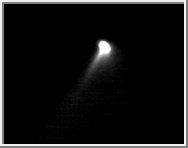|
COMETS EARTH JUPITER KUIPER BELT MARS MERCURY METEORITES NEPTUNE OORT CLOUD PLUTO SATURN SOLAR SYSTEM SPACE SUN URANUS VENUS ORDER PRINTS
PHOTO CATEGORIES SCIENCEVIEWS AMERICAN INDIAN AMPHIBIANS BIRDS BUGS FINE ART FOSSILS THE ISLANDS HISTORICAL PHOTOS MAMMALS OTHER PARKS PLANTS RELIGIOUS REPTILES SCIENCEVIEWS PRINTS
|
Related Document
Download Options
The solid nucleus of comet Borrelly is barely resolved in this image, enhanced to reveal the highly collimated dust extending towards the bottom left corner of the picture. The jet is attributed to dust carried outward by gas expanding outwards into a cone about 20 degrees across. The surface of Borrelly is composed of a mixture of dust and water ice, and as the comet approaches the Sun the water ice sublimes. The gases produced inside the comet by the Sun's heating race away from the surface into the vacuum of space, carrying the dust away with them. The jet was also seen in images acquired around 9 hours earlier. This suggests that the emission is coming from close to the rotation axis at the comet's constantly illuminated pole. The Sun is at the bottom of the image. Deep Space 1 completed its primary mission testing ion propulsion and 11 other advanced, high-risk technologies in September 1999. NASA extended the mission, taking advantage of the ion propulsion and other systems to undertake this chancy but exciting, and ultimately successful, encounter with the comet. |
